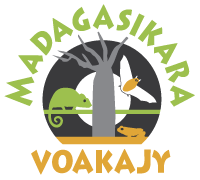On our fourth day I wake up a bit later, and I stay in my tent to read and write. Around eight our cook makes some coffee for the team – no sugar for the vazaha, he says giggling. My eating habits are a constant source of amusement for the team and nobody can understand how I can eat so little rice. But really, if you had a look at the ridiculous amounts of rice my team mates eat at every meal you would understand how. We have fries for breakfast, which is a welcome change after the dried fish we had yesterday. And the day before. I like this place, it's quiet, and being away from the villages I don't have children staring at me all day long.
We keep going with our meetings with the local communities. New village initiatives are founded to protect the forest, but I actually have the feeling that a lot of people here still think of the forest as something to be exploited – let's get some fuelwood, plant some banana trees, and roast the nice lemurs on a spit. There's still a long way to go, but the first results – like a group of local rangers that patrols the forest – are already visible. After each meeting we get on the move to mark the reserve borders – trees are marked with red paint, using a brush made with a piece of bamboo, and the GPS coordinates are recorded. As we get closer to the river the smell of water mint gets really strong. Local representatives come with us to witness the marking process. It feels a bit like a bad joke – how many local representatives do you need to mark a reserve? Well, apparently, every single one. We move in a team of 18 people.
When we are done with this side of the reserve we move to our third site, Ampahitra. The village seems to be a bit richer than the previous ones, and locals have a few animals – pigs, chicken and not much else. I spot a few cats sunbathing on the roofs. It was a long walk to reach Ampahitra, and we spend the rest of our first day here relaxing a bit. We are soon joined by a second team, who was in Mangabe to monitor the breeding ponds of the mantella frogs. Together with the Malagasy staff there's Steve, a Welsh volunteer who's staying with MV for a couple of weeks. Being Welsh Steve is a lot whiter than me, and I suspects he makes for a more interesting vazaha for the local children. He had the brilliant idea to walk barefoot the day before and he got some nasty parasites eating the skin of his feet. Fifteen of them. We fish them out with a needle, and then we go for a bath in the river. Malagasy women are doing laundry on the rocks, and a group of confused ducks – whose bottle-green head suggests some contact with mallards – passes us by.
Meetings go on, and for the first time the delimitation process takes us violently off-road. We climb steep paths, traced in the dust – luckily somebody dug some steps in the dry, yellow soil, but the climb is hard and I have to use my arms to help myself up more than once. Thorny bushes are on either side; when we finish the climb my arms and legs are bleeding, and my t-shirt is drenched in sweat. We reach the rice paddies and we keep making our way at the edge of the reserve. We are walking on long wooden poles that lie on the soft vegetation that grows on the water. The poles dip as we walk on them, and with one wrong step we end up in knee-high water. We cross several rough bridges – just three tree skinny tree trunks, laid on unstable poles, three meters above the water. The bridges rock and bend at every step, and it's almost a miracle nobody falls in the river.
We are back before dark, and we go to the local pub – just a one-room private house, where we can buy beer and rum as the owner sits on the bed. They give me a guitar and they ask me to sing a few songs. Soon it's dark and the whole village gathered round to hear songs almost nobody recognizes. My audience is easily pleased, to be honest, and the villagers are delighted when they know the songs – Bob Marley, Adele, Jason Mraz. The morning after we start our trek to our last site, an abandoned school surrounded by bushland, savannah and some forest fragments. We set our camp as it starts to rain. We wear our rain gear as the cook kills a chicken for dinner. It gets dark and cold, and we find shelter in our tents. It's our last night out, tomorrow we'll be back in Moramanga.



